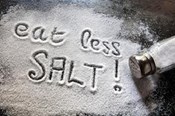Most of the sodium we consume is in the form of salt, and the vast majority of sodium we consume is in processed and restaurant foods. Too much sodium is bad for your health. It can increase your blood pressure and your risk for a heart attack and stroke. Heart disease and stroke are the leading causes of death in the United States.
In addition to excess sodium intake, other factors also influence blood pressure and the risk for heart disease and stroke. These factors include
- Age. The prevalence of high blood pressure (hypertension) increases with age and affects more than half of people aged 55–74 years and approximately three-fourths of those aged 75 years and older.
- Family History. Having a family history of high blood pressure, including parents or close relatives with high blood pressure, may increase the likelihood that you or your children develop it also. While you can’t control your family history, making healthy lifestyle choices may decrease your risk.
- Excess Body Weight. Being overweight can increase blood pressure; losing weight can help reduce blood pressure.
- Physical Inactivity. The Surgeon General recommends adults engage in moderate physical activities for at least 30 minutes on most days of the week. Such activity may help reduce blood pressure.
- Inadequate Intake of Potassium, Fruits, and Vegetables. Adequate consumption of naturally low sodium foods such as fruits and vegetables provide nutrients such as potassium and fiber. In addition to eating low-sodium foods, eating high-potassium foods such as potatoes, beans, bananas, and yogurt can help reduce blood pressure.
- Excess Alcohol Intake. Excess alcohol intake is associated with high blood pressure. Recommendations for alcohol intake advise moderation—no more than one drink per day for women or two drinks per day for men.
Current dietary guidelines for Americans recommend that adults in general should consume no more than 2,300 mg of sodium per day. At the same time, consume potassium-rich foods, such as fruits and vegetables. However, if you are in the following population groups, you should consume no more than 1,500 mg of sodium per day, and meet the potassium recommendation (4,700 mg/day) with food.
- You are 51 years of age or older.
- You are African American.
- You have high blood pressure.
- You have diabetes.
- You have chronic kidney disease.
The 1,500 mg recommendation applies to about half of the U.S. population overall and the majority of adults. Nearly everyone benefits from reduced sodium consumption. Eating less sodium can help prevent, or control, high blood pressure.
Source: http://www.cdc.gov/salt/







